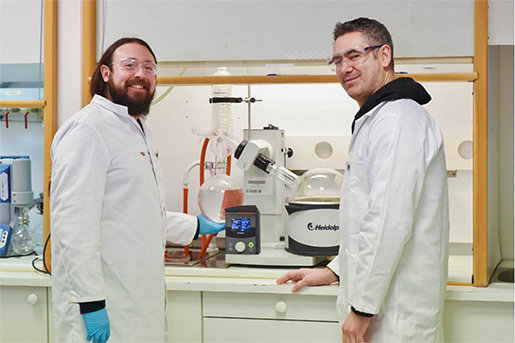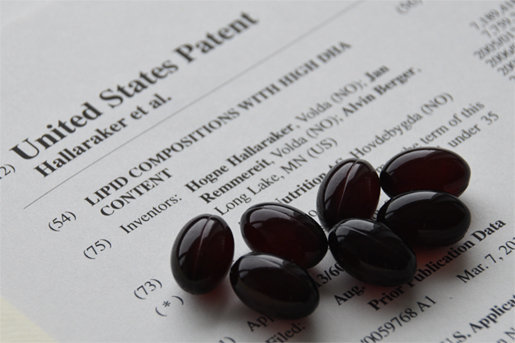1. Phospholipids from herring roe improved plasma lipids and glucose tolerance in healthy, young adults B Bjørndal et al, Lipids in Health and Disease 2014, 13:82, Lipidworld.
2. Bioavailability of EPA and DHA from Two Dietary Supplements ref. NCT019083 74 ClinicalTrials.gov.
3. Oral Supplements of Omega-3 as an adjuct in the treatment of psoriasis CR Sgarbi, R Villa, and MBL Franco, J. Investigative Dermatology, 9/2012.
4. Bioavailability of long chain omega-3 polyunsaturated fatty acids from phospholipid-rich herring roe oil Romega have been proven trough study to be significant to boost Omega-3 levels in the human body.
5. Clinical Study to Investigate Psorax35 Supplementation in Patients With Psoriasis The main objective of this study is to establish the efficacy and safety of Psorax35 supplementation in patients with Psoriasis.
Invention Patent
LIPIDCOMPOSITIONSWITH HIGH DHA CONTENT. Patent No.: US8846604.

The Science behind our Omega 3
Build lean, beautiful websites with a clean and contemporary look to suit a range of purposes.
View The Demos

Phospholipid Biology
As important components of biofilm, phospholipid DHA, EPA and choline have many biological functions.
DHA and EPA, as one of the essential fatty acids in human body, account for about 50% of the total lipids in the brain and have a wide range of health benefits for the brain, nerves and eyes. Phospholipids are not only important components of brain and retinal cells, but also involved in nerve signal transduction and other processes, which are crucial for brain and neural development. Moreover, phospholipids are the main transport substances for Omega-3 fatty acids across the blood-brain barrier. Choline, a B vitamin, plays an important role in neurotransmitter synthesis, cell membrane signaling, lipid transport and apoptosis regulation.

Brain
Omega-3 fatty acids play a key role in maintaining the normal structure and function of cell membranes. Lysophosphatidylcholine DHA (LPC-DHA) is the main form of DHA absorbed by the brain. Supplement of phospholipid DHA can improve the utilization rate of DHA absorption in brain.
Eyes
Omega-3 fatty acids make up about 50% of the total fatty acids in the retina and are important for maintaining the integrity of the retina and normal function of the optic nerve. Phospholipid DHA and EPA can actively cross the blood-eye barrier, effectively accumulate in the retina and optic nerve, and provide adequate nutrition to promote visual health.

Scientific research and innovation
ROMEGA has a comprehensive system of technological innovation and product development. After 20 years of research and practice, we have applied for 10 invention patents and completed more than 20 basic research and clinical trials.
Product development pipeline

The ROMEGA Neuronutrition product (HCO212) is in development and will be used primarily for nutritional interventions for neurodegenerative diseases, neurological dysfunction, neurological injury and neurodevelopment-related diseases.
The ROMEGA Emotional Health product (HCO351) has completed formulation testing and will be used as a nutrition intervention for autism, attention deficit and hyperactivity disorder.
Reference Literature
- Zhang TT, Xu J, et al. Health benefits of dietary marine DHA/EPA-enriched glycerophospholipids. Prog Lipid Res. 2019;75:100997.
- Graf, B.A., et al., Age dependent incorporation of 14C-DHA into rat brain and body tissues after dosing various 14C-DHA-esters. Prostaglandins Leukot Essent Fatty Acids, 2010. 83(2): p. 89-96.
- Liu, L., et al., Higher efficacy of dietary DHA provided as a phospholipid than as a triglyceride for brain DHA accretion in neonatal piglets. J Lipid Res, 2014. 55(3): p. 531-9.
- Jensen, H.H.; Batres-Marquez, S.P.; Carriquiry, A.; Schalinske, K.L. Choline in the diets of the us population: Nhanes, 2003-2004. FASEB J 2007, 21, LB46.
- Fischer, L.M.; daCosta, K.A.; Kwock, L.; Stewart, P.W.; Lu, T.S.; Stabler, S.P.; Allen, R.H.; Zeisel, S.H. Sex and menopausal status influence human dietary requirements for the nutrient choline. Am J Clin Nutr 2007, 85, 1275-1285.
- Thuppal SV, Von Schacky C, Harris WS, Sherif KD, Denby N, Steinbaum SR, Haycock B, Bailey RL. Discrepancy between Knowledge and Perceptions of Dietary Omega-3 Fatty Acid Intake Compared with the Omega-3 Index. Nutrients. 2017 Aug 24;9(9):930.
